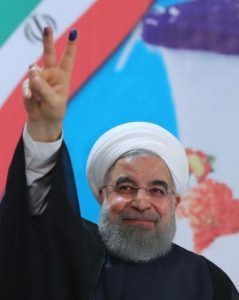By Reza Parchizadeh
Throughout history, every despotic regime has rushed to institute reforms before its impending demise. The Islamic Republic of Iran is no exception. Following the recent nationwide protests, the ruling elite in Iran has finally seen the so-called writing on the wall. The authorities have made small concessions and big promises in the vain hope of placating people’s overwhelming anger. However, when the pressure is on, the so-called reformists show their true nature by joining forces with the conservatives in crushing any public display of discontent.

In the past 100 years or so, the world has witnessed the rise and fall of many authoritarian regimes, most notably the collapse of the Russian Empire in 1918. Following a number of domestic and foreign policy disasters, including but not limited to a decisive defeat in the 1904–1905 Russo-Japanese War and a wave of nationwide political and social unrest directed at the government in 1905, Emperor Nicholas II [who reigned from 1894 to1917], appointed Pyotr Arkadyevich Stolypin as the 3rd Prime Minister of Russia in 1906 in the hope of turning the political tide in his favor.
Stolypin implemented agrarian and land reforms in order to counter revolutionary groups, resolve peasant grievances and discourage dissent. But he was a staunch monarchist and hoped to strengthen the throne. Between 1906 and 1909, thousands of dissidents were reportedly executed. Stolypin finally resigned in March of 1911 after the failure of his land-reform bill, and was assassinated later the same year. Emperor Nicholas II was forced to abdicate his throne in 1917. He and his entire family were executed in July 1918.
One can draw parallels between the events at the start of the 20th century in Russia and what is currently occurring in Iran. A number of prominent reformist politicians and journalists have responded to the recent protests. “The BBC and VOA [Voice of America, U.S. government-funded international news source ] have enthusiastically reported on the protests in Iran. If they truly knew the country and the Iranian nation, they’d realize that this wave will fizzle out quickly,” Seyyed Ataollah Mohajerani [former Minister of Culture and Islamic Guidance in the cabinet of reformist President Seyyed Mohammad Khatami] said in a tweet.
Meanwhile, Abbas Abdi [one of Iran’s influential reformist journalists] has described the protesters as “agitators” and has called on the government to deal with them decisively. Mohammad Reza Khatami [Secretary-General of the Islamic Iran Participation Front, the largest Iranian reformist party] has asked the government to identify the “foreign agents and anti-Revolutionary elements” among the demonstrators.
It is clear that the so-called reformist camp has joined forces with the conservatives to crush a popular uprising against years of oppression, corruption and mismanagement. This is a losing battle waged against its own people by a decaying regime that knows its days in power are numbered.

